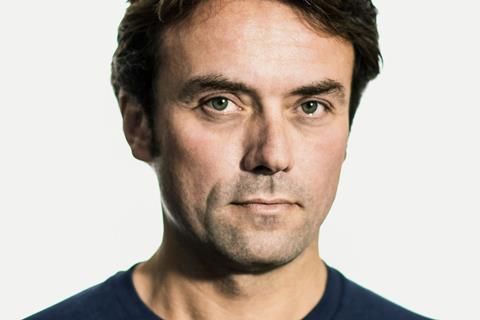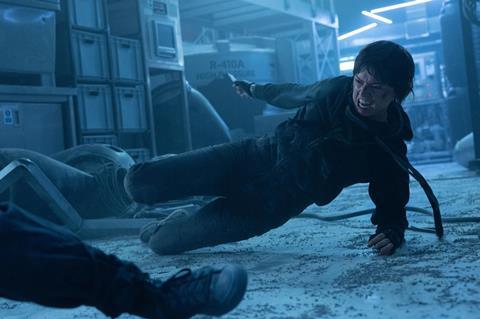
Officially headquartered in Luxembourg and with offices in London, Berlin and Los Angeles, Anton CEO Sébastien Raybaud views the production, sales and financing company he launched in 2011 as a predominantly UK outfit. Most of its team works out of London, and Anton’s focus on English-language projects and, increasingly, UK talent has brought it more strongly into the country’s orbit.
“It’s in our DNA to be both British and continental European,” he says. “That’s core to the mission – work with amazing filmmakers in the UK and Europe. The UK has some of the best talents in the world. You just need people like us to fund it.”
And funding is what Anton can do, fully financing the projects it backs. The new $107m (€100m) credit line that it secured through US investment firm BlackRock and announced at Cannes Film Festival has enabled the company to expand – the head count has grown from 35 in 2023 to 45 now – as well as accelerate its production pipeline. Eight feature projects have been greenlit in the past 12 months, a rebound from the strike-impacted 2023, and in 2025 Raybaud predicts Anton will “deliver between $150m and $200m of production value”.

At AFM, the company is launching one new project to buyers – psychological thriller Victorian Psycho starring Margaret Qualley – and continuing sales on animated features Night Of The Zoopocalypse, which premiered at Sitges and has its market premiere in Las Vegas (the company announced a string of sales at the start of the market), and Memoir Of A Snail, which has racked up prizes at Annecy, Sitges and London. (Raybaud, who will be in conversation today at AFM, is a fan of the move to Las Vegas: “A new environment – it’s good for business. And it’s an important market for us.”)
In 2025 the company’s $90m Greenland: Migration will be a big theatrical play for Lionsgate in the US and other distributors, while Raybaud also carries high hopes for David Mackenzie’s time-bomb thriller Fuze starring Theo James and Aaron Taylor-Johnson, which shot in London this summer and is now in post.
“Ideally, the place we’d like to be is where commercial meets authorship, and Fuze is absolutely that I think,” he says. “A real filmmaker, the script is super-smart, and at the same time it’s a big action film set in London.”
On the smaller budget scale but equally important to the slate is A Prayer For The Dying, a multi-territory co-production on which Anton is co-repping sales with New Europe Films. The 19th-century survival thriller set among Scandinavian settlers in post-Civil War America stars Johnny Flynn, and falls into the more arthouse-flavoured fare in the line-up, which would also include a pair of UK indie productions, The End We Start From and Femme.
Other completed projects include Martin Campbell’s Cleaner, starring Daisy Ridley, which Anton recently sold to Sky for the UK, where it will go straight to platform (“but all other territories we’ve sold are theatrical,” says Raybaud).
Continental opportunities
As it further ramps up its studio ambitions, Anton’s model is to find advantage in the co-production and soft-money incentive opportunities that exist across multiple European territories, especially the UK, Ireland, Benelux, France and Germany. And with buyers looking for more substantial English-language theatrical packages, Raybaud feels Anton is in a strong position to become a pre-eminent company for these Europe-based productions.
Being a home for UK talent is also a priority, and he sees an entrepreneurial streak in UK producers that he feels can be lacking in continental counterparts. “The producers in the UK are some of the best in the world,” says Raybaud. “When you work with a German director or a French director, they don’t know how to talk to the Anglo-Saxon audience, they are not geared towards the US or the UK. A UK producer can work with European directors and help them cross over. That’s very exciting.
“I come from a country [France] that is heavily subsidised and a reason why I was very excited to go into the UK industry is because it was made of fighters because it was less subsidised, basically,” he continues. “The [new UK] Independent Film Tax Credit is a great thing, but it’s not the only thing. You need to also support the entrepreneurs and the people who build businesses.”

When Raybaud takes a producer credit on many of his projects, as he has on Greenland: Migration, Fuze, Cleaner, Kate Beckinsale action film Canary Black and Jamie Childs’ motocross thriller Jackdaw, it is from the perspective of “because it’s our money and we want to control that risk. It’s a studio model – we don’t want to be one of 500 producers in the UK. We are bringing a platform that’s missing to this country and to Europe in general. We always work with producers on the ground; I’m not a producer on the ground.”
Anton’s favoured genres continue to be action, thriller and sci-fi, but animation is also key to the portfolio. “That’s part of our effort to build relationships with amazing auteurs,” he says, putting My Life As A Courgette director Claude Barras in that camp. Anton co-repped Barras’ Sauvages, which premiered at Annecy, with Charades, and the film is nominated for European Film Awards for both best film and best animated feature.
Anton is exploring more TV production and has an in-house development team for small-screen projects; Cheaters was a short-form scripted series and co-production with BBC Studios that was recently greenlit for a second series, and the company has several projects in active development with broadcasters.
But Raybaud’s focus is still film, and at Screen International’s recent ‘The Future of UK Film’ Summit he noted that the sales potential for “the right film” would still outstrip what he can sell a series for. “That’s why I’m very bullish on the film sector,” he says. “Our customers are distributors throughout the world and they are powerful gatekeepers. They buy the rights for all media for 15, 20 years – without them, the companies that are lower in the value chain can’t do anything – pay-TV [deals], for instance.”
As the supply of English-language action, thriller and genre projects has dried up from studios and streamers, who are keeping these projects for their own platforms, it has opened up opportunities for companies like Anton. “It’s the same demand but less suppliers,” says Raybaud. “And then you look at the regulatory environment in Europe and you can make these projects more efficiently and cheaper there. If you put the two together, it’s a great opportunity.”
While Raybaud said at the summit that the US market has been “brutal”, he feels cautiously optimistic that its buyers will be more active again soon for his type of projects. With deep layoffs at studios, less in-house production as a result and streamers refocusing their priorities, “these should make licensing a priority again”.
A new dawn is coming, he hopes: “We are closer to the end of this massive adjustment than we are to the beginning.”






![The Brightest SunScreen[Courtesy HKIFF]](https://d1nslcd7m2225b.cloudfront.net/Pictures/274x183/3/5/0/1448350_thebrightestsunscreencourtesyhkiff_312678.jpg)


















No comments yet